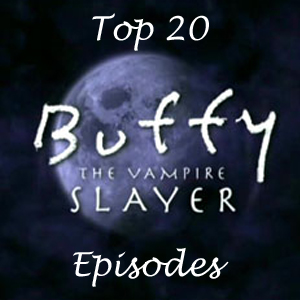Today marks the 20th anniversary of “Buffy the Vampire Slayer,” which premiered on March 10, 1997. That sentence is technically incorrect – “Buffy” debuted with a movie on July 30, 1992, so this is the 25th anniversary year. The “Buffy” we all know and love is a reboot (a fact that gives me pause whenever I scoff at reboots).
The movie shouldn’t be discounted, as people who liked the film provided a good chunk of that early TV audience. (That audience has now grown to include people who were too young for the show when it was first on TV, such as my friend Devin, who was 9 when it premiered and now counts “Buffy” among his favorite shows.)
However, when I unveil my 20 best “Buffys,” it goes without saying that I’m not talking about the movie, or even the comic book, which is currently chronicling Season 11. I’m talking TV episodes. This list is in a slightly different order than the top 10 I published in the Brainerd (Minn.) Dispatch when the series ended in 2003 (although if anyone would’ve known that without my admission, I’d be stunned).
Everyone’s tastes change slightly with time. Still, I doubt “Buffy” will ever fall outside of my personal top 10; I have it in fifth place, behind only “Once and Again,” “My So-Called Life,” “Freaks and Geeks” and “Firefly.” It is, however, my No. 1 show that was not canceled prematurely.
Here then are my top 20 “Buffys” for the 20th anniversary. Yes, there are some snubs, but really, which of these masterpieces would you bump to make room for them?

1. “Passion”
Season 2, episode 17, written by Ty King
A lot of shows kill off main characters and are lauded for being daring. But for me, the best example of this art form is when Angelus murders Jenny Calendar. Up to this point, Angelus had been toying with the Scooby Gang, drawing pictures of Buffy sleeping (he really is a fine artist) and killing Willow’s goldfish. So even on repeat viewings it seems like Jenny will get away right up until the point that Angelus snaps her neck in the dim school stairwell. My favorite scene, though, is when Buffy and Willow get the phone call from Giles — we see it from Angelus’ perspective outside the house, we hear his voiceover about passion and see him grinning as Buffy slumps to the floor and Willow cries and is comforted by Joyce. Composer Christophe Beck – whose addition to the crew after Season 1 bumped up the epicness — delivers crazy good music behind it all. The theme is in the title: If you don’t have passion for what you’re doing, there’s no point to it. Without Angelus’ love of causing pain, Jenny’s need to make things right, Willow’s crying, Giles’ need for revenge, Buffy’s stoicism, Xander’s resolve and even Cordelia’s panic about her car not being Angelus-proof, “Passion” isn’t the best “Buffy” episode ever. But it has all that, so it is.
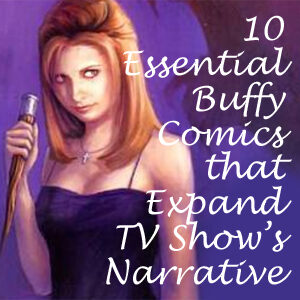
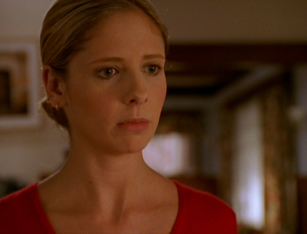
2. “The Body”
5.16, Joss Whedon
It’s a couple of Anya lines that get me reaching for the Kleenex in TV’s cornerstone episode about death. First is in Willow’s dorm room: “And Xander’s crying and not talking, and, and I was having fruit punch, and I thought, well, Joyce will never have any more fruit punch ever, and she’ll never have eggs, or yawn or brush her hair, not ever, and no one will explain to me why.” Second is in the hospital waiting room: “I wish that Joyce didn’t die … because she was nice. And now we all hurt.” And Buffy says simply, “Thank you.” Emma Caulfield’s Anya, in some ways the black sheep among the main characters, pushes “The Body” to the level of masterpiece.
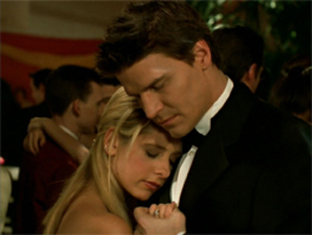
3. “The Prom”
3.20, Marti Noxon
This episode made me cry the first time I saw it (and on the half-dozen viewings in the summer of 1999), because I believed in true love like Buffy and Angel’s. Today, I recognize my youthful naïveté, yet I still find it impossible to not get teared up during the final sequence where Angel comes back for one last dance to the Sundays’ cover of “Wild Horses” (right after Buffy touchingly receives the Class Protector award from Jonathan). And that’s just the grace note to an episode where Noxon plays the ol’ Buffy-and-Angel chords flawlessly, starting with Buffy’s hopeful notion that she can add some mirrors and get her own drawer at Angel’s place, leading through the sewer break-up scene, and reaching a crescendo when Buffy cries in Willow’s arms and tells her “Right now, I’m just trying to keep from dying.” There’s also a nod to those of us who haven’t experienced epic star-crossed romances: The super-quick flashback scene showing Tucker’s motivations (Tucker: “Will you go to the prom with me?” Harmony: “No.”). “The Prom” perfectly caps off three years of Buffy-Angel pain, but that Tucker clip is just as perfect in its own way.
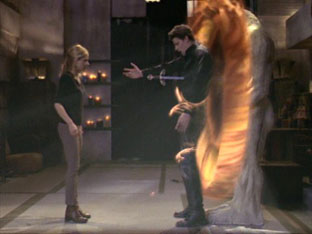
4. “Becoming, Part 2”
2.22, Whedon
Usually, I’m more interested in the journey than the ending, so I don’t have much sympathy when someone says “Well, it was good, but then the ending sucked, so therefore I didn’t like it.” But the final 5 minutes and 24 seconds of “Buffy’s” second season puts the lie to my dismissal of conclusions. This sequence pumps up everything we’ve seen to this point, and gives it a fresh meaning: We thought we were watching a story about Angelus sending the Earth into a demon dimension. Then, when the world is saved but Buffy has to kill Angel to do it, we realize we were watching something much more personal — and painful. Whereas Bart pinpoints the exact moment when Ralph’s heart breaks in “The Simpsons,” there are several candidates for the moment when a viewers’ heart breaks here. It could be Buffy saying “Angel?” or “Close your eyes,” or Joyce finding Buffy’s note, or any line of Sarah McLachlan’s “Full of Grace,” or the pan-out on “Now Leaving Sunnydale – come back soon!” Or something as simple as Buffy’s lip curling and her face collapsing from superhero to little girl. We all needed a hug in the spring of ’98.
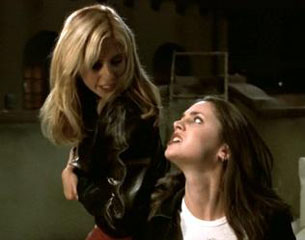
5. “Graduation Day, Part 1”
3.21, Whedon
The Evil Faith arc is wrapped up (at least for the season) with the best fight scene in the show’s history, as both Slayers explore their dark sides, but for different reasons. There isn’t a lot of dialog during the fight, but it’s pretty juicy (Faith: “That’s mine.” Buffy: “You’re about to get it back.”), punctuated by Sarah Michelle Gellar’s cracking voice, which tells you how hard this is for Buffy. Eliza Dushku is at the top of her game, too, as we can hear just a bit of fear in her voice even in taunts like “Give us a kiss” (which is followed by Buffy clocking her in the jaw, natch). The season finale — featuring high school students blowing up the school to kill the demon-mayor — is universal, but this one is personal.
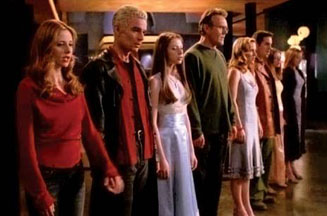
6. “Once More, With Feeling”
6.7, Whedon
Whedon spent the whole previous summer working on this episode, and it shows. The fact that he tailors the songs to his cast’s strengths helps; for example, talented singer Amber Benson has a gorgeous pop ballad, whereas non-singers Alyson Hannigan and Michelle Trachtenberg only get a couple lines. There’s a reason why Gellar never tried to cross over into pop music like many of her contemporary actresses, but I admire the way she throws herself completely into her two songs and sells them. Anthony Stewart Head and James Marsters are both solid crooners, and Nicholas Brendon also holds his own, while Caulfield knocks it out of the park with both singing and dancing. Like all great “Buffys,” the storytelling is efficient, with room for humor (“Bunnies, bunnies, it must be bunnies!”) and big revelations (“I think I was in heaven”), yet the musical also makes for a rocking soundtrack album. It’s because of this episode that I had to amend my stance on musicals to: “I dislike musicals — except the ‘Buffy’ one.”
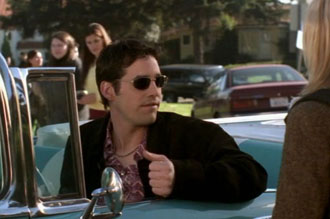
7. “The Zeppo”
3.13, Dan Vebber
Just as Darin Morgan came out of nowhere to turn “The X-Files” on its ear with “Humbug,” Vebber gives us a totally new kind of “Buffy” episode here. In the A-plot-turned-B-plot, he shows how the plot of “Buffy” is nothing but clichés and spectacle when it’s not elevated by metaphors and our investment in the characters, essentially doing a stripped-down retelling of the Season 1 finale “Prophecy Girl.” And in the B-plot-turned-A-plot, Xander goes through an “American Graffiti”-style yarn, only instead of it being his last night of high school, it’s his last night on Earth (if he fails to get Jack to defuse the bomb, or if the Scoobies fail to close the Hellmouth). While other TV series have done a “Rosencrantz and Guildenstern” riff, few achieve this level of storytelling deconstruction paired with character construction.
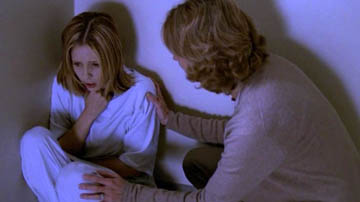
8. “Normal Again”
6.17, Diego Gutierrez
Poisoned by a demon’s stinger, Buffy mentally drifts back and forth between Sunnydale and an asylum where her six years in Sunnydale never happened. It’s a daring Philip K. Dickian effort from Gutierrez in his only “Buffy” episode, although his grasp of the characters makes sense when you realize he had been Whedon’s assistant for a few years. Because the final scene is in the asylum, after Buffy had drunk the antidote, a strict interpretation of the episode says the asylum is real and Sunnydale is a figment of Buffy’s imagination. However, common sense tells us that can’t be the case (1, there are too many scenes that aren’t from Buffy’s point of view, including the entire “Angel” spinoff, and 2, it would be stupid — even “Dallas” only wiped out part of its run with “It was all a dream”). I reconcile it in my head thusly: Buffy was still feeling fading effects of the poison; the camera pulling away from her and out the door indicated the fading away of the asylum world and the return to normalcy.
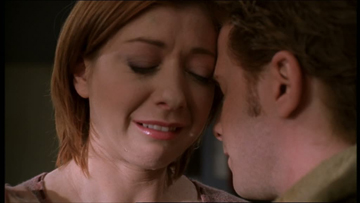
9. “Wild at Heart”
4.6, Noxon
There’s one thing that can have us reaching for the Kleenex faster than Sad Buffy, and that’s Sad Willow, as this episode demonstrates. The real-world pain of a breakup comes through thanks to a series of emotional scenes made more jarring by Hannigan’s ability to portray Willow’s sadness at Oz’s cheating and departure. From Oz’s perspective, his werewolf side is drawn to sultry Veruca and his human side is drawn to sweet Willow, as Seth Green bows out from the main cast with his best performance. (Oz returns one last time in “New Moon Rising” in the back half of Season 4.)
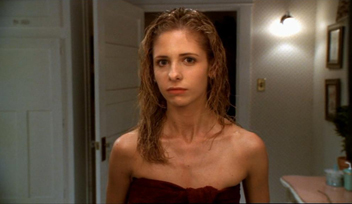
10. “Who Are You?”
4.16, Whedon
On my first viewing of this classic body-switch yarn, it was Gellar’s performance as Faith that really stood out, but with subsequent viewings, I’ve appreciated Dushku’s turn as Buffy more and more. Whedon finds an innovative way to kick the “Redemption of Faith” arc into high gear. “Because it’s wrong” starts off as a joke but gains meaning after Faith spends time in Buffy’s skin. Likewise, we sense that Buffy — having been held by Watchers who see her as scum — feels sympathy for Faith, although that notion wouldn’t be continued in the “Angel” crossover.
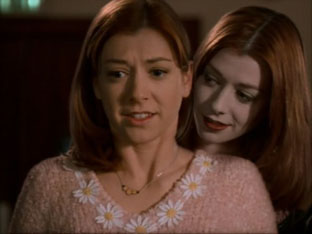
11. “Doppelgangland”
3.16, Whedon
Although not as artistically layered as “The Zeppo,” Willow’s answer to that Xander-centric episode makes up for its thematic simplicity by being the series’ funniest episode. Part of the reason for “Buffy’s” greatness is that it always plays to its strengths: Vamp Willow was a hit in “The Wish,” so Whedon gives us even more of the character here, and Hannigan is deliciously entertaining as confidence-lacking “old reliable” Willow, playfully wicked Vamp Willow, and Willow pretending to be Vamp Willow. As for the humor, where to begin? My personal favorite is a take on an age-old joke: Angel bursts into the library to tell everyone that Willow is dead, says “Oh, hi Willow,” then after a beat says “Wait a minute …”
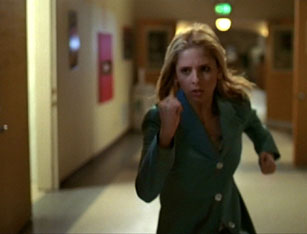
12. “Becoming, Part 1”
2.21, Whedon
Xander reminds Buffy that Angel is a murderer, and Buffy says “It’s not that simple.” Flashbacks to Angel’s origin story — and, as a bonus, Drusilla’s — illustrate that point: He was a victim himself (of Darla) and he was tortured by having a soul for the better part of the 20th century until Whistler dragged him out of the rat-infested alleyways during Buffy’s freshman year of high school. The L.A. flashbacks allow Whedon to cleverly rejigger scenes from the movie (now cast as Merrick, Buffy’s first Watcher, is the “Jump to Conclusions Mat” guy from “Office Space”); I’m not even bothered by the fact that Angel seeing Buffy in ’96 contradicts the pilot episode. Beck delivers one of his best fight scores during the pivotal library battle. “Becoming, Part 1” is all set-up, but a delicious set-up it is.
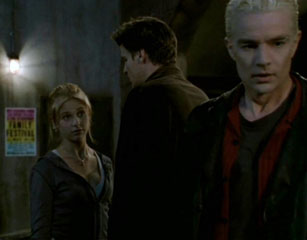
13. “Lovers Walk”
3.8, Vebber
This beautiful treatise on the nature of love explores the heartbreak, ecstasy, emptiness and fullness of love through four relationships. In his only Season 3 appearance, Spike nicely sums things up in regard to Buffy and Angel: “You’re not friends. You’ll never be friends. You’ll be in love till it kills you both. … Real love isn’t brains … It’s blood screaming inside you to work its will.” Just as Angel and Buffy can’t have what they want (due to Angel’s curse), Willow and Xander don’t know what they want — until the powerful moment when Cordelia and Oz walk in on them kissing. Then Willow realizes all she wants is for Oz to talk to her again. Although “Lovers Walk” has plenty of dark comedy (via Spike, natch), an awesome fight scene (Angel throws a vamp in a garbage can, and Buffy skewers two vamps with one stake) and a happy ending for Spike (he resolves to torture Dru until she loves him again), it’s defined by that final montage where all six characters are alone and sad. This is the first “Buffy” episode that made me cry, because like Spike, I’m love’s bitch (but at least I’m man enough to admit it).
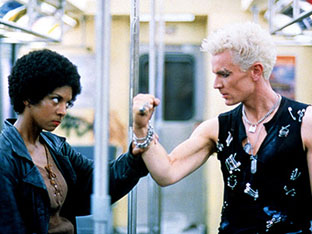
14. “Fool For Love”
5.7, Douglas Petrie
Before “Fool for Love,” Spike was merely highly entertaining. From this point forward, we sympathize with him, because we see how much he struggled with love as a human (his poetry is as heartfelt as it is awful) and continues to do so now that he’s a vampire. Petrie pulls off the effective trick of making us see this story from Spike’s perspective, with Buffy as the antagonist. The episode gains a “Zeppo”-like level of depth when we see some of the same scenes – this time with Spike as a hanger-on in the vampire quartet — in the “Angel crossover episode “Darla.”
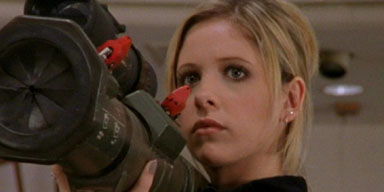
15. “Innocence”
2.14, Whedon
Buffy and Angel, acting like goofy teenagers mere weeks before in “Bad Eggs,” now know they are in a tragic romance. “I try to stopping loving you, but I can’t,” Buffy says in “Surprise,” the strong springboard to this episode. Both David Boreanaz (reveling in the deliciously soulless Angelus) and Gellar (no one cries into a pillow better) ratchet up their acting games. Still, the most heart-tugging scenes involve Willow: Being crushed when she finds Xander kissing Cordelia, but falling in love with Oz when he refuses to kiss her to make Xander jealous. Also featuring our first glimpse of the evil-and-loving-it camaraderie between Spike, Drusilla and Angelus, this episode is the first masterpiece since Season 1’s “Angel,” with or without the overhyped “men turn evil after sex” subtext.
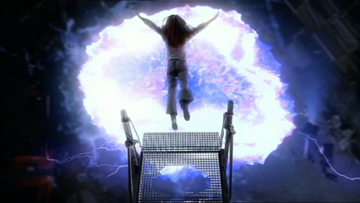
16. “The Gift”
5.22, Whedon
The final minutes rank right up there with the end of Season 2’s “Becoming, Part 2” in terms of endings piled high with tearjerker moments. Buffy’s words to Dawn, played over the shot of her jumping into the interdimensional portal in order to close it, is memorable: “The hardest thing to do in this world is live in it …” But Spike breaking down and crying is the moment that got me on this latest viewing. It’s also worth noting that when this episode aired, well into the Internet age, I and my friends had no idea that Buffy was going to die; I was wrapped up in the idea of Dawn having to die to save the world. Kudos to Whedon for well-played narrative misdirection.

17. “Angel”
1.7, David Greenwalt
“Buffy” is one of the few shows that can make me stare numbly at the screen after the credits and absorb what I’ve felt emotionally, and this is the first episode of the series that does that. It’s a combination of “What a masterpiece of TV” and “What a cruel world we live in, where good people have to feel pain like that.” Future episodes would be slicker – thanks largely to Beck – but Boreanaz and Gellar play the emotional beats like a symphony, presaging things to come. Buffy and Angel can’t be together for about 100 reasons, starting with the obvious “she Slayer, he vampire,” but oh how we yearn to rebel against that fact.
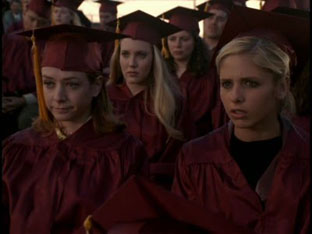
18. “Graduation Day, Part 2”
3.22, Whedon
The Buffy-Angel relationship concludes with an overhyped vampire-draining-a-Slayer sequence. But the centerpiece of the Season 3 finale is the graduation ceremony that marks the end of our time at Sunnydale High. Whereas Season 2 ends with a surprise, “Buffy’s” best season ends with — to quote Giles — “a synchronicity that almost borders on predestination.” Of course the students blow up the high school. Of course the principal gets eaten. Of course the episode ends with Oz noting that they survived not the just battle, but high school in general. (Of course, the special effects of the demon mayor aren’t very good.) Yet it’s as satisfying as it is inevitable.

19. “Consequences”
3.15, Noxon
Building on her famous “I don’t care” line in response to accidentally killing the deputy mayor in “Bad Girls,” a defensive, vaguely apologetic Faith slides into evil step-by-step, starting by telling Giles that Buffy killed the man (Giles immediately knows she’s lying). Faith’s arc works because of Dushku’s ability to waver between wounded and scary; even when she’s becoming more dangerous, she’s still sympathetic. Contrast this with Anakin Skywalker killing a bunch of kids in “Revenge of the Sith” — we immediately lose all sympathy for him because he makes a selfish choice that hurts others. Faith is reacting to defend herself, and people get hurt only because they are in the crossfire. “Star Wars” says fear eventually leads to suffering, but “Buffy” shows it more effectively. That’s not to say “Buffy” doesn’t get mythologically symbolic: Faith wears white in “Bad Girls,” black in “Consequences.”
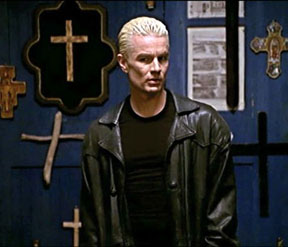
20. “Lies My Parents Told Me”
7.17, David Fury and Drew Goddard
In this standout hour from the relatively weak final season, we find there’s room for one last surprise: Spike turned his mum into a vampire! The episode nicely dovetails with Principal Wood’s flashbacks to his mom focusing on “the mission” at his expense. Completing the trio of “lies” from parental figures, Giles distracts Buffy so Wood can kill Spike. This episode also crystallizes the difference between Spike and Angel, and why Spike was able to recover faster from getting his soul back: Whether William or Spike, his feelings are always out there to get stomped on, and that’s why we love him.
Click here for an index of all of John’s “Buffy” and “Angel” reviews.
Comments
I mostly agree with your choices here. Not including ‘Hush’ would be considered blasphemy by some, but I think it’s overrated. I would have included Restless, though. Posted By Michael Shonafelt | 3/13/17 10:49 PM
“Hush” is a perfect episode. But it’s all text, no subtext, and it’s a Season 4 ep that advances Buffy/Riley. And I miss the spoken word every time I watch it; it makes me appreciate the non-silent episodes more. When it first aired, I thought it was artistically brilliant, but it still didn’t have the emotional impact of a Season 3 episode; nothing in Season 4 did except the Season 3 continuations (the Oz and Faith arcs). I struggle with dream-type episodes, so just by personal taste, “Restless” isn’t a top 20 episode for me. I know it has a lot of rewards for astute viewers, but it’s a lot of work to dig that stuff out of the episode. I also struggle with the current series “Legion.” Posted by John Hansen

